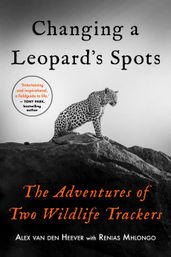My Octopus Teacher: Are animals sentient beings?
We need more true stories of genuine human-animal bonds. We need this because for as long as we go on believing that we are superior to and separate from nature, the sooner we will destroy our home, and ultimately ourselves. Inspired by 'My Octopus Teacher', Alex van den Heever, author of Changing a Leopard's Spots reflects on how relationships with animals can have a profound impact on the life of human beings.

As Craig Foster showed in his latest Netflix hit called My Octopus Teacher, a relationship with a wild animal can have a profound impact on the life of a human being. I observed with interest the public reaction to Craig’s relationship with that female octopus. “It’s just amazing that one can form a relationship with an octopus!” is one comment I’ve heard repeatedly.
My question is; is it so amazing? Beyond the fact that we are not accustomed to seeing humans and octopuses being buddies. Although the octopus is probably the world’s smartest invertebrate, it is more importantly a fellow being with which we share the planet. Like every living creature on earth, the octopus fulfils a particular and vital role in maintaining the natural ecological balance that humans need in order to survive. If we are to make progress as a species, we need the octopus to thrive.
At a deeper level we know that our lives, and its life, are inextricably linked. You probably felt that when the pyjama shark nearly killed her. It is clear from the documentary that that octopus was capable of experiencing joy. In one scene it played with a small school of fish with the same playfulness and innocence I’ve seen my two-year-old daughter interact with our bantam chickens in the garden. It also demonstrated stress and fear, not to mention ingenuity, when the shark chased her. And when it bit off one of her tentacles it certainly looked like she was in pain. She didn’t move for days. She was able to perceive, show awareness to, and respond to Craig in the same way a dog would. And even a human would.
This is important because these are the elements that we use to define sentience. It is significant because until quite recently humans believed we were the only true feeling beings. In this instance Craig’s octopus recognised the sentience in him. There are many similar stories of humans forming relationships with obscure animals in their natural habitat. But sadly, most go untold. Craig’s film shows us that, even in our collective darkest hour, we can still create a relationship with the natural world. We recognise intelligence in our fellow human brothers and sisters without question. Craig’s story inspires us to search for consciousness in nature too.
As exciting as stories are of lions and leopards, the world’s natural history TV channels would do better to reveal the potential of humanity’s relationship with nature’s ‘ordinary’ citizens. We need more true stories of genuine human-animal bonds. We need this because for as long as we go on believing that we are superior to and separate from nature, the sooner we will destroy our home, and ultimately ourselves. If we are to survive as a species, we need to actively seek out the sentience in all life that exists around us.
Just like they do in us.

Changing a Leopard's Spots
by Alex van den Heever
World-renowned wildlife trackers Alex van den Heever and Renias Mhlongo have spent more than two decades working together, tracking leopards and lions at Londolozi, jaguars in South America and grizzly bears in the United States.
In Changing a Leopard’s Spots, Alex shares stories from his life with Renias, including the successes, failures, dramas, laughter, disappointments and highlights. As they experience numerous adventures, Alex and Renias learn to trust and rely on one another – both in order to stay alive, in a literal sense because of the sometimes dangerous environments in which they work, but also to develop a deep and meaningful relationship.
By challenging each other and learning from one another they break down social, cultural, racial and personal boundaries and obstacles that often divide South Africans; and in the process, the two men forge an unbreakable bond.
